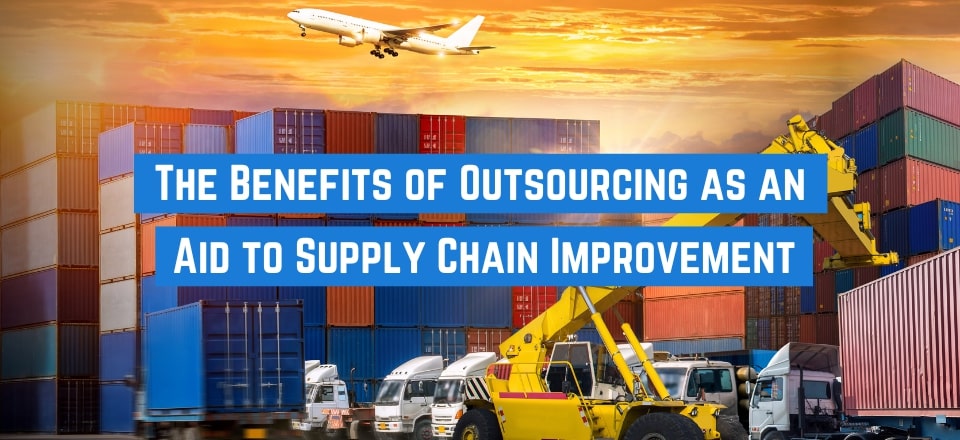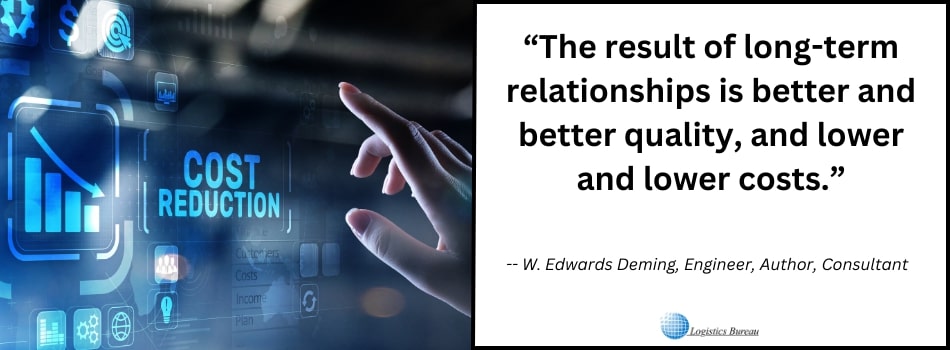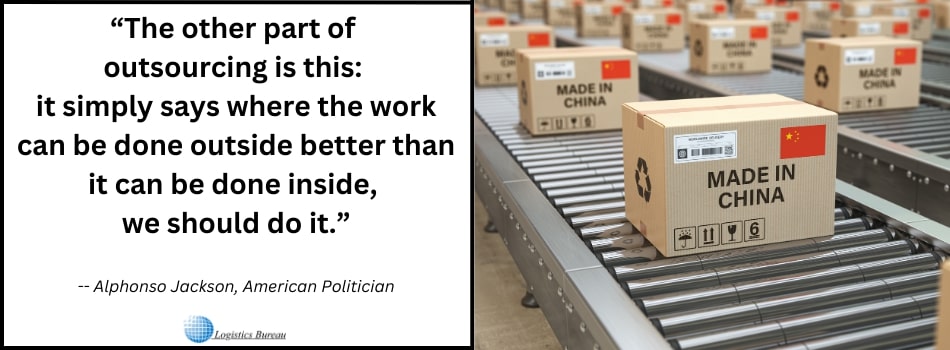Across our many blog posts, videos, webinars, eBooks, and other shared content, you’ll find a wealth of information about various aspects of outsourcing in the supply chain.
However, I can’t recall writing a general guide about exploiting outsourcing opportunities to improve your supply chain. To date, most of our content has covered topics related either to logistics or manufacturing outsourcing.
In this article, I will redress the balance by exploring outsourcing from a more holistic perspective, focusing on ways to consider outsourcing partnerships for improvement throughout the supply chain.
If you’re a decision-maker with accountability for your organisation’s entire supply chain, and you’re just starting to think about outsourcing, perhaps to reduce costs or improve service, this post should prove well worth the few minutes it will take you to read it.
What Can You Outsource, and What Should You Outsource?
We’ve arrived at an age where, realistically, you can outsource just about any business activity, including all those involved in managing a supply chain. But just because you can outsource it all doesn’t mean you should.
Indeed, I caution you against outsourcing anything you consider a core business function. So, for example, outsourcing sales activity is not typically a good idea if yours is a retail sales company.
Otherwise, pretty much any activity that directly enables your supply chain to function is fair game—if you’re confident that your supply chain will be the better for placing that activity into the hands of an external service provider.
No Standard Answers to the Outsourcing Question
Within the scope of this article, I will refrain from offering advice on which elements of your supply chain you should outsource, because what might improve the supply chain for one company may be detrimental to another.
Instead, I will highlight how outsourcing can improve your supply chain under the right circumstances. But, of course, what those circumstances are is for you to decide.
Without further ado, then, let’s move on so I can fulfil the promise above. Read on to learn how you can make your supply chain function with less cost, greater efficiency, and improved customer service—or perhaps all three—by handing off some relevant activities to an external contractor.
Outsourcing for Reduced Supply Chain Cost
Few business leaders would argue that reducing costs in the supply chain is an improvement. However, many have yet to ponder the idea of outsourcing as a possibility for supply chain cost reduction.
Meanwhile, many who have outsourced with cost savings in mind have made errors in the process. As a result, they found that outsourcing generated fewer savings than they projected.
At the risk of being repetitive, the benefits gained from outsourcing depend heavily on the circumstances surrounding a business and its supply chain, along with several other factors—including the choice of contractor.
If the conditions are right, and the right outsourcing partner is chosen, outsourcing can reduce supply chain costs. Let’s look briefly at three ways in which it can do so.
1. Labour-Cost Reduction
One of the most effective ways to reduce labour costs through outsourcing will be to use contract manufacturing, typically engaging a partner based in a country with lower labour costs than yours.
While China is less popular than it once was as a destination for outsourced manufacturing, you can still find partners there that will save you money on manufacturing, assembly, packaging, and other labor-intensive parts of your supply chain.
Meanwhile, countries in Southeast Asia, such as Vietnam and Cambodia, are enjoying growth as offshore manufacturing centres. The thing to watch, of course, is whether the labour-cost benefits of offshoring outweigh any increase in the cost of logistics.
A lot depends on the location of the markets you sell into and how far your distribution centres are from the contract manufacturer’s country if you keep your distribution in-house. For example, US-based companies may be quite fortunate if they have access to manufacturers right on their doorstep in Mexico, a country with far lower labour costs than the rest of North America.
2. Access to Economies of Scale
By outsourcing manufacturing, logistics, or other supply chain support activities such as procurement, your company may access the economies of scale enjoyed and passed on by specialist service providers.
Your organisation may be one of many that a contract partner serves. If so, due to its size and buying power, the partner will likely be able to provide goods or services at an advantageous cost to you compared to the costs of sourcing internally.
Additionally, a large-scale supplier can typically spread fixed costs over a larger production volume, reducing the price per unit.
3. Increased Supply Chain Efficiency
In manufacturing outsourcing, a large contract producer specialising in the products you sell will have the expertise, technology, and processes to streamline production and reduce waste, which can result in cost savings.
Meanwhile, outsourced logistics can help reduce your overhead costs by reducing the need for your company to own facilities and equipment, which can be expensive to maintain.
It’s worth noting, too, that while exploiting the power of outsourcing for efficiency can contribute to supply chain cost reductions, it also offers several more types of improvement opportunities, warranting a section in this article all to itself, so that’s what we’ll look at next.
Outsourcing for Efficiency
As we’ve already discussed how a third-party specialist manufacturer can help you increase production efficiency, we’ll skip to some other efficiency-oriented benefits of outsourcing in the supply chain.
Firstly, outsourcing is an opportunity to tap into specialised expertise. For example, when you outsource supply chain elements such as procurement or logistics, you can use the providers’ knowledge and experience to guide you in optimising your supply chain.
A procurement specialist can help you source raw materials, components, or (if your company is not a manufacturer) finished goods more efficiently. Through collaboration with your procurement partner, you can reduce inventory levels and then potentially downsize your warehouse capacity needs.
Access Industry-Leading Technology
Outsourcing can help your company to exploit technology to improve supply chain efficiency. Many logistics service providers, for example, have invested in advanced technologies such as process automation, machine learning, and artificial intelligence, which they use, on behalf of their clients, to streamline warehouse and transportation operations and reduce errors.
For instance, automated order processing can reduce order processing time, while predictive analytics can help forecast demand more accurately, reducing the risk of stock-outs or excess inventory.
Perhaps your organisation does not have the supply chain and logistics budget to allow investment in these best-of-breed platforms and applications, or you don’t wish to assign significant investment commitments to a non-core element of your business. In either case, outsourcing could be the way to benefit from the efficiencies of cutting-edge technology without the substantial costs of procurement.
Process Specialisation
Outsourced manufacturers, logistics providers, and other supply chain service partners dedicate all their resources to optimizing processes that, while essential for the success of your organisation, are secondary to its principal objectives. That typically means outsourcing offers greater process efficiency because you have specialists managing things on your behalf.
Rather than shouldering the costs of investment in equipment, human talent, and other resources, and the expense involved in a “trial and error” approach to developing efficient supply chain processes, you might choose to outsource instead, and gain instant access to efficiency at a far lower cost, due to the providers’ economies of scale.
Outsourcing for Service Improvement
Creating a better customer experience is as highly dependent on your supply chain as it is on your store layout, the performance and demeanor of your sales staff, and the policies and procedures of your online or brick-and-mortar sales facilities.
Indeed, nowadays, the supply chain is one of the first targets for improvement when seeking to enhance customer service, and outsourcing can be one way to attain your service objectives.
While customer service and supply chain efficiency are closely linked, we won’t dwell so much on efficiency here since we covered it in the previous section of this article. Suffice it to say that service will often be boosted as a collateral benefit when your efficiency increases.
So what are the other ways in which outsourcing can improve the service element of your supply chain? Most benefits will likely lie in outsourced logistics, although a competent contract manufacturer with a strong service ethos can also support you in delivering service excellence.
But for now, let’s focus on logistics outsourcing. With that in mind, here are some ways to target supply chain service improvements by working with a 3PL.
1. Improve the Rate of On-time Delivery
By working with a 3PL that has relationships with multiple carriers your organisation can potentially benefit from faster, more reliable transportation and reduce the risk of delayed deliveries. Opportunities might include the provision of faster deliveries to your customers to increase their satisfaction with your delivery service levels.
2. Improve Inventory Management
Will your logistics outsourcing strategy include contract warehousing? If so, you might exploit opportunities to improve inventory management by partnering with a provider experienced in IM optimisation for various industries and distribution models.
Through such a partnership, you can improve IM performance in several ways, such as minimising stock-outs while reducing overall inventory levels. Ultimately, that translates to improved stock availability and enhances your reputation for reliable sales and service among your customers.
3. Facilitate Simpler (and More Reliable) Returns Processes
Customers’ returns have always been a thorn in the side of businesses that sell products. Let’s take ecommerce as an example. If your enterprise operates in that sphere, you’ll be only too aware that online sales operations handle a much higher volume of returns than traditional brick-and-mortar retail operations.
For some companies, returns can be almost unmanageable; for most, they involve costly and burdensome processes. Lately, though, aside from improving returns efficiency and cost by outsourcing logistics to a competent 3PL, you may have the option to outsource returns processing only, contracting it out to one among an emerging genre of providers specialising in reverse logistics flows.
Improved Reverse Logistics: A Double-barreled Benefit
The advantages of outsourced reverse logistics could sit as appropriately in the efficiency section of this post as here in the service discussion. For example, does your business process a high volume of returns?
If the answer is “yes,” outsourcing can help you increase process efficiency, reduce the cost of logistics as a percentage of sales, AND enable you to provide a more straightforward and reliable returns service for your customers.
Perhaps product repairs are a feature of your service provision? Here too, logistics outsourcing could help. With a reverse logistics partner, you could improve turnaround times, making your repair/maintenance cycle more streamlined and faster for increased customer satisfaction.
A Few More Ways Outsourcing Can Aid Supply Chain Improvement
In addition to cost reduction, efficiency gains, and service improvement, outsourcing in the supply chain offers other benefits that may contribute to overall improvement, not just within the supply chain but applicable to your entire business operation.
To conclude this article, we’ll look at these further possibilities for supply chain improvement through outsourcing.
1. Increase Responsiveness to Demand Fluctuations
Because many contract manufacturers and third-party logistics providers serve multiple customers, they must base their business models on the ability to scale rapidly.
On the other hand, if your company relies on internal resources, adding or removing assets and increasing/decreasing throughput, in response to demand fluctuations, can be an ungainly, and sometimes costly, exercise.
Outsourcing manufacturing or logistics to providers with built-in flexibility can help you respond to changes in demand quickly—and seamlessly in the eyes of your customers.
2. Simplify Forays into New Markets
Establishing an effective supply chain can be one of the most significant challenges when expanding your sales territory into new geographies. Outsourcing your logistics to a partner specialising in shipping to, from, and within your chosen market—or to one with a physical presence in that territory—can simplify the process considerably. It could even provide you with an instantly established means of economical transportation and inventory storage.
Similarly, suppose your company needs to purchase materials or goods within a foreign territory, for example. In that case, a procurement partner with established commercial relationships with vendors and manufacturers can make setting up a supply chain in a new market much more straightforward.
3. Enhance Supply Chain Visibility
In any supply chain, but especially a long one, it’s not easy to maintain visibility into every stage. From procurement to production to delivery, there are many moving parts in a supply chain, and keeping track of everything is a significant challenge.
Outsourcing can help you improve supply chain visibility if your partner is a provider that has the tools and technology to track and monitor the processes.
For example, a 3PL can provide real-time tracking and reporting on the status of your inventory, shipments, and deliveries. That can significantly help you to identify inefficiencies and bottlenecks in the supply chain, enabling you to make informed decisions and apply appropriate remedies.
4. Mitigation of Risk in the Supply Chain
When we assert the benefits of outsourcing to help reduce supply chain risk, we don’t mean simply passing risk on to the service providers. But, unfortunately, that’s a mistake some companies make, and it inevitably comes back to bite them.
The regulatory landscape in logistics, for example, can be complex. Furthermore, in some circumstances, the shipper or supply chain owner remains accountable for compliance, even when using the assets and resources of a service provider.
The best way to address risk through outsourcing is to choose service providers with robust risk management programs. They should also exhibit solid expertise in regulatory compliance across the entire logistics spectrum and be conversant with any specific rules or codes applicable to your industry.
Outsource for Supply Chain Improvement—When it Makes Sense
To summarise, outsourcing some, or even all, of your supply chain activities, can be an effective improvement strategy. It can help you to enhance the following aspects of your supply chain:
- Cost reduction
- Process efficiency
- Customer service improvement
- Visibility
- Risk reduction
- Responsiveness
It can also help you expand your supply chain to enter new markets. However, I can’t stress enough the reality that outsourcing is not always the right decision, and that there are plenty of pitfalls to avoid if you want to achieve the desired outcomes.
So if I were to share two golden rules for outsourcing strategy, they would be:
1) In each case, be sure that a decision to outsource—or not—is based on a thorough analysis of the pros and cons, given the characteristics of your supply chain and business model.
2) Follow a stringent process for selecting your outsourcing partner(s) and preparing the ground for the partnership.
Remember, too, that there are many possible paths to supply chain improvement and that outsourcing is only one of the available options.
A Little Objective Guidance Can Help
At Logistics Bureau, our consultants have helped countless organisations make objective assessments and decisions regarding outsourcing in their supply chains and assisted many more in finding the right vendor/service provider and setting up the partnership.
We’ve been doing this for years, so we have the expertise and experience to help you avoid the traps and ensure that outsourcing brings tangible supply chain improvement to your enterprise.
We’ll also help you assess whether other approaches would be appropriate for your supply chain improvement efforts, either instead of, or in concert with, an outsourcing strategy.
We’d love to open a dialogue with you to help you learn more—or discuss how we might help you improve your company’s supply chain—and it will only take 15 to 20 minutes. So book a free consultation call with one of our outsourcing experts today.
Editor’s Note: The content of this post was originally published on Logistics Bureau’s website dated April 4, 2023, under the title “The Power of Outsourcing for Supply Chain Improvement“.










